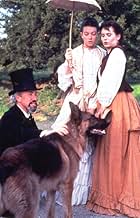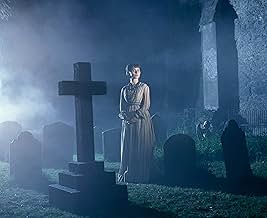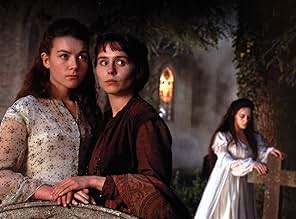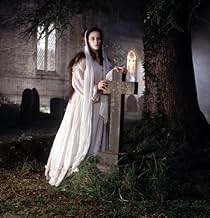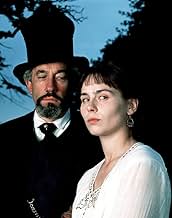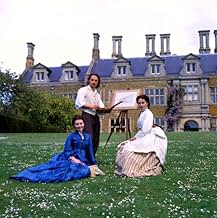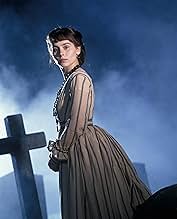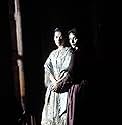CALIFICACIÓN DE IMDb
7.0/10
1.3 k
TU CALIFICACIÓN
La historia gótica de un par de hermanastras cuyas vidas acaban atrapadas en una gran conspiración que gira en torno a una enferma mental vestida de blanco.La historia gótica de un par de hermanastras cuyas vidas acaban atrapadas en una gran conspiración que gira en torno a una enferma mental vestida de blanco.La historia gótica de un par de hermanastras cuyas vidas acaban atrapadas en una gran conspiración que gira en torno a una enferma mental vestida de blanco.
- Ganó 2premios BAFTA
- 3 premios ganados y 3 nominaciones en total
Explorar episodios
Opiniones destacadas
Wilkie Collins' "The Woman in White" is a great read--a creepy and funny mystery novel with multiple narrators, one of which is one of the strongest female characters I've ever come across in Victorian fiction. Unlike some of the other IMDB critics of this film version, though, I read it only after seeing the BBC production. While I thoroughly enjoyed the film, its plot is almost totally different from the novel. It made me wonder if the writers had read two Wilkie Collins novels and decided to combine them, taking the character names from one and the plot twists from the other.
The look of the production is impeccable--gorgeous costumes, lovely English country houses, and a use of light and shadow that perfectly captures the pervasive disquietude. I especially liked that two of the scariest scenes took place in broad daylight, in light-colored places, instead of such customary gothic locales as dark, cobwebby dungeons. The BBC's recent Victorian productions have all striven for an accuracy of period detail (no more beehive hairdos worn with hoopskirt gowns)--that includes dirt and squalor, along with sumptuous furnishings. The Pre-Raphaelite art angle, though not in the book, is neatly tied in, too.
And the acting is excellent. Tara Fitzgerald and Justine Waddell seem to have cornered the market on these period pieces, and Fitzgerald in particular, is perfect as Marion, the steely but loving sister of the soft and sweet Laura. Ian Richardson (the diabolical MP Francis Urquhart in the "House of Cards" trilogy) is brilliant as the girls' hypochondriac uncle, thrown into paroxysms at the sound of loud noises. Simon Callow is Count Fosco, the villain who kills with a caress. He and Marion are worthy opponents; don't miss the scene in the British Museum, when she glares at him over an Egytian sarcophagus and subtly lets him know that she is onto him.
One flaw in the production is the irrelevant voice-over at the beginning and end of the film, but it is not serious enough to mar one's enjoyment of this film.
The look of the production is impeccable--gorgeous costumes, lovely English country houses, and a use of light and shadow that perfectly captures the pervasive disquietude. I especially liked that two of the scariest scenes took place in broad daylight, in light-colored places, instead of such customary gothic locales as dark, cobwebby dungeons. The BBC's recent Victorian productions have all striven for an accuracy of period detail (no more beehive hairdos worn with hoopskirt gowns)--that includes dirt and squalor, along with sumptuous furnishings. The Pre-Raphaelite art angle, though not in the book, is neatly tied in, too.
And the acting is excellent. Tara Fitzgerald and Justine Waddell seem to have cornered the market on these period pieces, and Fitzgerald in particular, is perfect as Marion, the steely but loving sister of the soft and sweet Laura. Ian Richardson (the diabolical MP Francis Urquhart in the "House of Cards" trilogy) is brilliant as the girls' hypochondriac uncle, thrown into paroxysms at the sound of loud noises. Simon Callow is Count Fosco, the villain who kills with a caress. He and Marion are worthy opponents; don't miss the scene in the British Museum, when she glares at him over an Egytian sarcophagus and subtly lets him know that she is onto him.
One flaw in the production is the irrelevant voice-over at the beginning and end of the film, but it is not serious enough to mar one's enjoyment of this film.
This is one of those great novels that cannot be corrupted by the screening of it, no matter how much you alter in the book to fit it into a picture, as the plot itself, the skeleton of the story, is unavoidable and carries it all no matter what you cut out of the flesh or add to it. Tara Fitzgerald and Andrew Lincoln as the main characters are convincing enough, although different from the book, while Simon Callow as Count Fosco, although his appearance is brief in comparison with the book, gets the place in the sun as the central hub of intrigue, one of the most classical and irresistible villains in literature.
But the main asset of this TV film version is the quiet mood and the excellent composition of the pictures - many scenes are just like Victorian paintings, and a painting actually is made to play almost like a red thread through the film.
The finale, although completely different from the book, makes the film dramatic enough though, and the only thing you really lack in this film version is the high intensity of the book building up a tension that makes the finale triumphant in its karmic justice.
They say the 1982 version is better. It is to be noted that Ian Richardson plays in both versions. It will be interesting to find it somewhere.
But the main asset of this TV film version is the quiet mood and the excellent composition of the pictures - many scenes are just like Victorian paintings, and a painting actually is made to play almost like a red thread through the film.
The finale, although completely different from the book, makes the film dramatic enough though, and the only thing you really lack in this film version is the high intensity of the book building up a tension that makes the finale triumphant in its karmic justice.
They say the 1982 version is better. It is to be noted that Ian Richardson plays in both versions. It will be interesting to find it somewhere.
Although I still prefer the 1948 film version, which is more satisfyingly developed (in spite of an ending that comes out of nowhere), this newer version of Wilkie Collins's mystery has a lot to offer. Tara Fitzgerald and Justine Waddell are excellent as the two very different heroines, and Simon Callow is, as always, delightful (if not as deliciously repulsive as Sidney Greenstreet in this role). The mystery, romance and suspense begin to take a moody, even depressing turn in the second half, but this is still, overall, a satisfying film for fans of gothics, visually compelling and more than a little haunting.
Having read, and thoroughly enjoyed the book, I must say that except for a few phrases and scenes borrowed from the book, the plot did not resemble that of the book. I gave it five stars for effort and atmosphere.
I have not seen this movie yet, nor have I read the novel. In fact, I have not seen any version of this story, including the recent musical. I have this 1997 DVD though, as well as the London cast recording, both of which were gifts. That having been said, I just want to point out an error in two of the reviews...
I am no fan of Hollywood, usually preferring foreign versions of most movies. Unfortunately, reviewers dad-hunter (j. hunter) from the UK and harrsman5 from Chicago have it wrong. Dad-hunter wrote, "For reasons known only to Hollywood" and ends his review with, "Badly done, Hollywood!" Harrsman5 asked, "I wondered how badly Hollywood could screw this up," and said that the movie makers "Hollywoodized" the story.
This was a British production, not a Hollywood project. This is clear from the credits, as well as the IMDb.com description. It is a co-production for the BBC by Carlton International Media, Ltd and WGBH. Carlton and the BBC are in the UK, and WGBH, a PBS affiliate, can hardly be considered Hollywood. While harrsman5 may be confused by seeing it on Masterpiece Theater here in the US, I was very surprised by dad-hunter's comments since s/he is from the UK.
As for critics who chastise it for not being faithful to the novel, I think it's better to rate the movie on its own merits. Many of us have never read the novel, nor plan to. When I finally view it, I will judge it based on the movie alone..
I am no fan of Hollywood, usually preferring foreign versions of most movies. Unfortunately, reviewers dad-hunter (j. hunter) from the UK and harrsman5 from Chicago have it wrong. Dad-hunter wrote, "For reasons known only to Hollywood" and ends his review with, "Badly done, Hollywood!" Harrsman5 asked, "I wondered how badly Hollywood could screw this up," and said that the movie makers "Hollywoodized" the story.
This was a British production, not a Hollywood project. This is clear from the credits, as well as the IMDb.com description. It is a co-production for the BBC by Carlton International Media, Ltd and WGBH. Carlton and the BBC are in the UK, and WGBH, a PBS affiliate, can hardly be considered Hollywood. While harrsman5 may be confused by seeing it on Masterpiece Theater here in the US, I was very surprised by dad-hunter's comments since s/he is from the UK.
As for critics who chastise it for not being faithful to the novel, I think it's better to rate the movie on its own merits. Many of us have never read the novel, nor plan to. When I finally view it, I will judge it based on the movie alone..
¿Sabías que…?
- TriviaIan Richardson plays the same role in this and an earlier adaptation of the story: The Woman in White (1982).
- ConexionesReferenced in The Toxic Avenger: The Musical (2018)
Selecciones populares
Inicia sesión para calificar y agrega a la lista de videos para obtener recomendaciones personalizadas
Detalles
- Fecha de lanzamiento
- País de origen
- Sitio oficial
- Idioma
- También se conoce como
- 白衣女郎
- Locaciones de filmación
- Productoras
- Ver más créditos de la compañía en IMDbPro
Contribuir a esta página
Sugiere una edición o agrega el contenido que falta

Principales brechas de datos
By what name was The Woman in White (1997) officially released in India in English?
Responda

